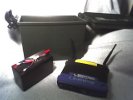|
Greetings, all! I'm just starting to get into HSMM-MESH, and am loving it. Admittedly, I've got zero experience with GHz frequencies, but the study is fascinating. Just flashed about four WRT-54G's with great success. Oh my goodness, is this an eye-opening and devastatingly cool use of older technology. Come enter my brain for a sec...I need to know if bi-directional amplifiers (BDA's) would prove to be at all useful with long runs of LMR-400. The story is, I've got a cemented 8' pole out back that I was originally going to use with an HF antenna. Sadly, it didn't work out, and opted for a vertical for the moment. However, I was thinking: could there exist a potential opportunity to use this pole to mount a 24dBi parabolic WiFi antenna to use with a newly flashed HSMM-MESH router? The game is afoot! Here's the sad reality: the LMR-400 run is 140'. At first blush, I said forget it. However, I've been reading about bi-directional WiFi amplifiers and started wondering. My question is: would there be any hope of using my 140' run of LMR-400 coax with one of my flashed WRT-54G's (with a 24 dBi parabolic)? Would a BDA (or some other solution) make this dream a reality? Please go easy on me, as I tend to be more of a dreamer than anything. (LOL!) If BDA's won't do the trick, is there something reasonably-priced that would work? Thank you, thank you, thank you for reading this post, and dreaming-a-little-dream with me. :) Cheers, blessings, and 73s!
Todd
N9ZWY |
